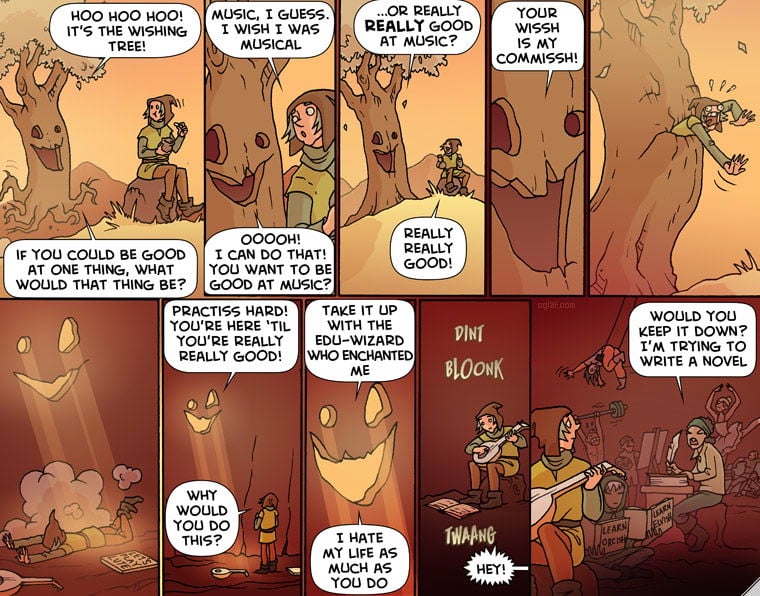https://www.threepanelsoul.com/comic/talent
It’s an oldie from 2015, but I still think about it whenever people talk about being talented at something.

Ah, one of the rare SFW Oglaf comics.
How do they get food in there, and other science facts?
From the guy who wanted to be a 5-star Michelin chef (material gets provided). Just pray he already is there for a while.
maybe woosh @me but Michelin stars only go up to 3
He wants to be the first to get 5
It’s just a comic, you really should just relax
Bathroom…
Nothing wrong with dreaming to be a plumber.
Bill
Related: “Your camera takes good pictures!”
You made my eye twitch.
deleted by creator
Nah, I heard that long before cell phone cameras were even a thing.
There is merit in practice, but natural talent is very real. One person could spend years practicing something that someone else picks up and surpasses that person in a year.
Im a low low ELO player but enjoy chess. I teached a kid how to play on a summer event, and the kid, probably around 10 years old, never did the same error twice and easily beat me on the third day (around 5 games a day vs me and who knows how many against the other event leaders)
Really humbling, but I think I helped kindle a new hobby for the kid
You did good. Fostering and developing the younger generation.
I compete in video games (smash bros ult) and there is a lot of humbling experiences when you are unable to beat a child that is 10 years younger than you every week for 2 straight years.
Nothing wrong with playing Electric Light Orchestra.
What’s your favorite song to play?
No doubt, but imo “natural talent” is way less common than just people who have put in the work, at least for musicians in my experience. For every person i know that just started rippin shit from when they were 3 years old there’s like 20 more folks who have just put in the hours. I also think some people who seem to have that natural talent it’s more like they just were immersed in that environment from birth. Music is a lot like a language; you can always learn a new language as an adult but people that grow up speaking it because of their environment will make it look effortless.
In addition, a lot of the “natural talent” might be coming from early childhood practice when children’s brains are the most malleable - eg if a kid is drawing since they are 6, it is much more likely they’ll be noticed and cultivated. Which makes them more likely to appear talented when they are 11 / 15 etc, when they might be noticed and cultivated in turn etc. Early advantages pile up.
Not to say that some things gene related are not advantageous - you are not likely to become a basketball player if you are short, even if you put in enormous amounts of practice.
Yep exactly what I was trying to get at
I was a pretty high level athlete (in swimming so not a pro, but did compete at an international level) and I can back this up too.
“Natural Talent” is a thing. But that only really applies to the very very top end of the spectrum. Like professional athletes absolutely have genetic advantages over a normal human. But you can get 98% of the way there through just pure determination, grit, and practice.
I imagine it’s not quite the same for music, but unless you’re trying to become a billboard level musician or someone who travels around putting on shows, you can absolutely become “good enough” just from (in this case) 12 years of dedicated practice.
“You’re lucky you had parents who could afford: a piano, an apartment big enough for a piano, time for you to practice besides your studies, and maybe even a music teacher”
Much better
Excuses. You can start practicing on a cheap keyboard or digital stage piano you can find at a thrift store that you can play on your bed. You don’t need to have a stand up piano to learn to play. With internet nowadays it’s very easy to learn the basics like learning scales and reading sheet music. And you can practice between studies. You don’t need to practice hours a day to learn some basic songs. Like 10 minutes a day can take you very far.
Ah yes, everyone who didn’t have the privilege of growing up with parents who actually care about their child’s hobbies instead of busy verbally and physically abusing them or had the money to spare to buy a working used piano, which I have never personally seen at a thrift store, instead of skipping dinner for a week is obviously making excuses.
While we’re at it, let’s also pretend that being taught by youtube is the same as having a real instructor giving you feedback and on a real piano. I don’t even know why we bother having schools or teachers anymore because after all, anything can be learned from the internet if you just pull yourself up by the bootstraps. Oh and don’t forget you parents better afford to buy you a smartphone or else goodluck watching those tutorials.
Never try anything!
It’s obvious from the comic that it doesn’t talk about the way you mention doing it.
Talent is hard to define. In my opinion talent = unobserved practice/study.
This picture gets the concept across pretty well. But it can also happen with kids that “happen” to be good at something. Like sports. Was that kid a natural at baseball, or did he just watch a lot of baseball games and played backyard baseball a shit ton so he just knew the rules/strats before any of the other kids?
Some people learn faster than others yes, but learning in itself is a skill.
Maybe this isn’t true, but it is definitely 100% more effective than assuming talent is outside of your control or an obstacle that can not be cleared.
Reminds me, Malcom Gladwell’s “Outliers” book had a section about his interesting observation that pro hockey players’ birthdays are skewed to the earlier months of the year. He attributed that to a kind of butterfly effect:
- Youth hockey leagues set league cutoffs by age, and mostly all start at the same time.
- The early month kids are slightly older, bigger, and stronger
- Since they are better at the very beginning, they get more playing time, more encouragement, maybe visit more “all-star” events, where they might get extra coaching, etc.
- eventually those kids actually just become better, because they had a better environment to grow.
I mean idk how accurate this exact instance is, but I feel it’s a good thought experiment in thinking of how seemingly insignificant parts of the environment (like when in the year all the youth hockey leagues start) can impact whatever talent is. The whole nature vs nurture thing.
If they weren’t talented then they never would have been able to start.
That’s luck based.
ITT: Neurotypicals assuming anyone can do anything with time.
Im autistic and have abysmal muscle memory. I can’t tie my shoes or unlock a door without looking closely. I still managed to get decent at the violin. If you enjoy a thing and really really want to learn it, and have the time and physical requirements, it’s possible. It’s also ok if being slower to learn than most others spoils it for you- that’s why I stopped taking lessons at a certain point.
This meme kind of upset me because I tried and can’t play piano because my brain can’t use both hands how they are required to play piano.
People do have to be naturally talented to do certain things.
I’m autistic, I think its likely true for most people (including autistic people) that they could feasibly learn to become very good at one specific thing given sufficient practice, regardless of their starting point. BUT:
Its not capability in the strictest sense that is the privilege. Its money, time, and having intrinsic pleasure from the activity.
Someone who hates playing the piano could still 100% reach the same abilities of someone who loves playing the piano. They just don’t because they don’t get any intrinsic enjoyment out of it. So the person who is wired to get intrinsic joy out of the activity also gains the extrinsic benefits of eventually becoming very good at piano and the benefits that come with that.
Not everyone gets intrinsic joy from activities that have extrinsic rewards once you get very good at them. I really enjoy video games and debate, and I’d say I’m very good at both. But almost no one gives a fuck and my extrinsic reward for being good at those things is basically nothing.
IDK about other neurological frameworks however.
To be fair, to be able to practice regularly for so long to gain skill is rather lucky. Also, not all practice is equal, so having someone teach you to practice more effectively is a privilege. Either that or practicing on your own in an unguided manner and still being able to gain skill takes talent.
Yeah, that’s lucky and very well could require being lucky enough to have some sort of talent along the path.
This. It’s easier to practice/study if you don’t share a room with 3 siblings and don’t need to spend your off time supporting the family in various ways.
Also, don’t get mad at that person trying to give you a compliment
I hate that having to work so damn hard on something is the only way to success. I don’t have time to train for everything I want to be good at.
“Talent” could also be an affinity for practicing that skill. I don’t think I’m exceptional at programming, but I got good at it because I enjoyed it and that was enough to drive me to develop that skill. There are other skills I didn’t develop as much because I didn’t feel as driven to pursue them.
In my region, people use “talented” as a compliment, not necessarily to indicate their skill was not hard-won.










